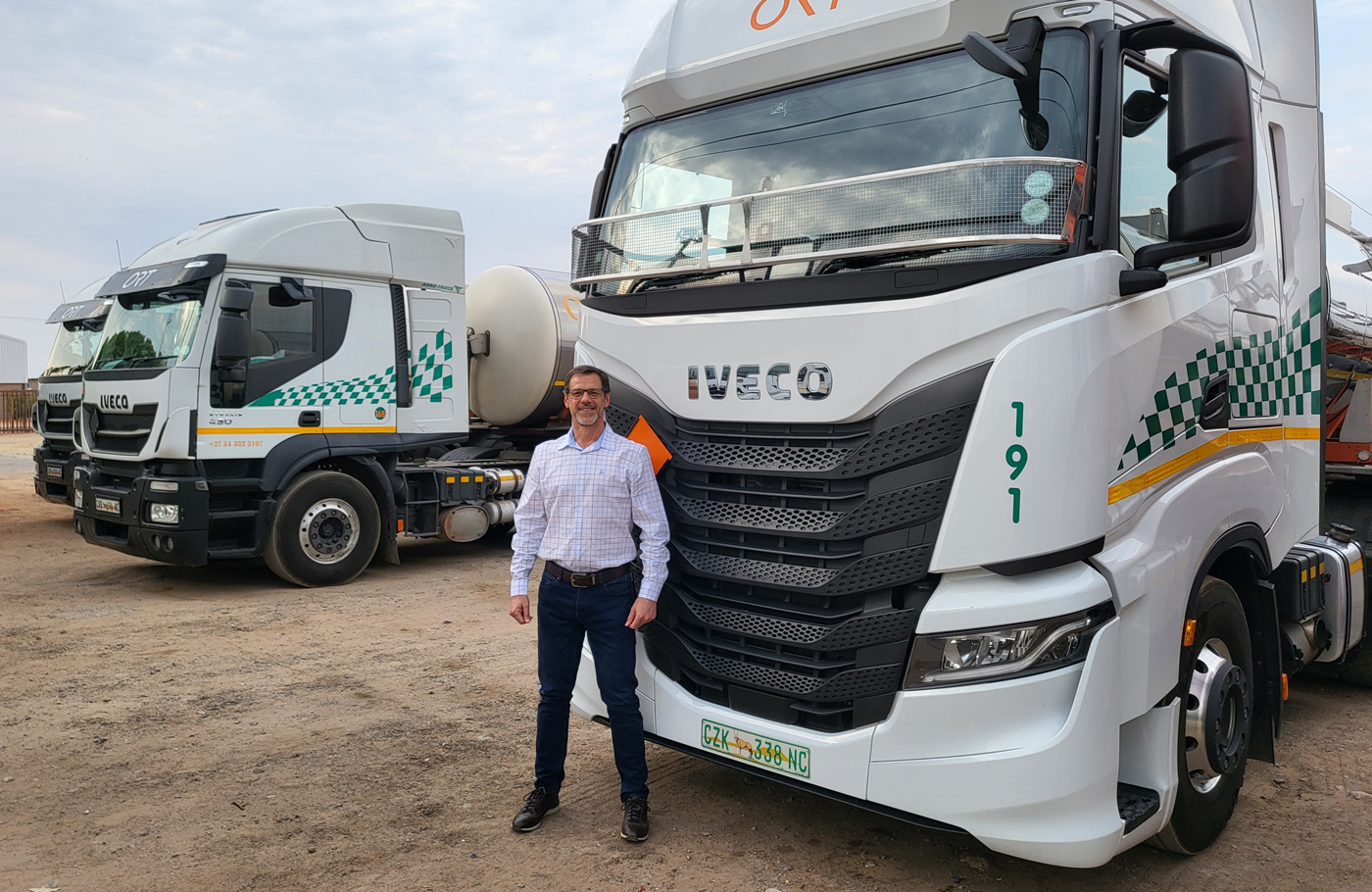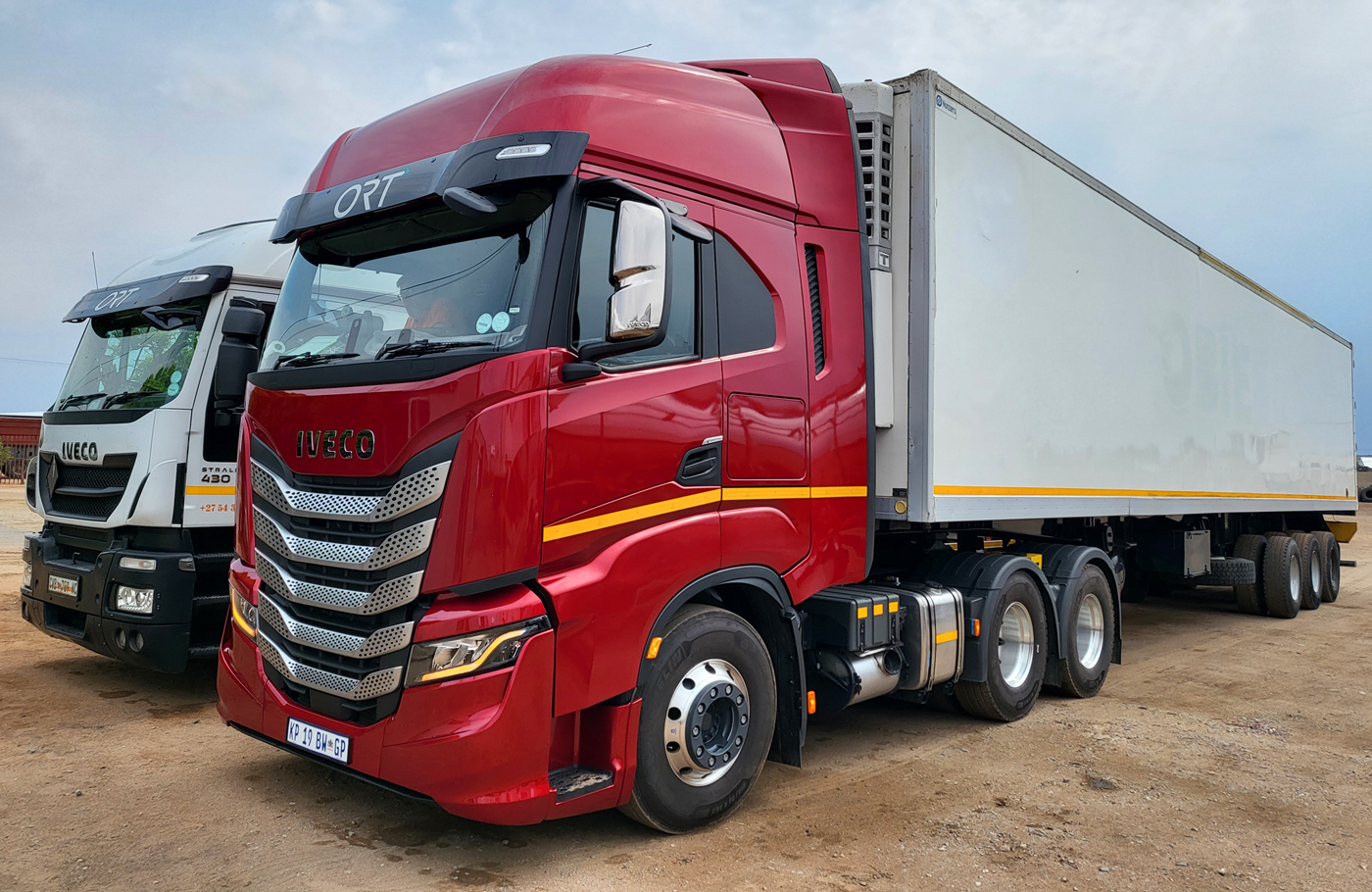A perfect partnership
A perfect partnership
We chat to Arno Kock, finance director at Orange River Tankers (ORT), to gain some industry insights and discover how the right partnerships can drive a business forward.
Starting as a family-owned business in 1981, ORT was set up by WHC Barnard to serve the agricultural industry in the Orange River region. Originally the company had 10 full-time employees and six trucks. The growth of the region’s wine industry demanded an increase in the transport of bulk wines to clients in the bigger centres, creating the opportunity to expand ORT’s logistics operations.
Please summarise what ORT does.
ORT transports bulk alcoholic products, like wine, ciders, and brandy, as well as other liquid food products, like various juice concentrates, molasses, sunflower oil, and other oils, using food grade spec tankers nationally and in the SADC region. We recently acquired a reefer company as part of our growth and diversification strategy and to expand our value proposition to customers.
The company has been operating for more than four decades. How has the industry changed over the years?
The industry is much more competitive than it was 20 years ago, which is when I started my career at ORT.
We were one of the first companies to incorporate lifting axles with super single tyres on our tanker fleet. Today this is general practice to maximise payload and reduce rolling resistance for improved fuel consumption. In-cab cameras with AI functionality and advanced satellite tracking systems are also now the norm these days.
Our own operations grew exponentially as the local wine industry expanded. In 2012 we decided to open a depot in the Western Cape, which is the Mecca of South Africa’s wine industry. We’ve had a great growth period since then.


What challenges have you faced during this time, and how have you gone about overcoming them?
Among the greatest challenges at this point in time are the massive fuel increases. The average fuel price last year was below R15/litre – and now it stands at about R21/litre. It is definitely the biggest cost driver in our company, comprising around 45% of all of our costs.
To address this challenge, we’re buying fuel from suppliers with the best prices, and we erected bulk diesel tanks above ground at all of our sites, in Heidelberg and in Upington. So, most of our trucks try to refill in the depot. We have also selected fuel vendors on our specific routes who offer competitive prices.
We’re regularly testing trucks from different manufacturers, to update our total cost of ownership (TCO) calculations and to ensure that we procure the best trucks in terms of fuel consumption and efficiency for our applications.
The shortage of professional truck drivers is another challenge we’re facing. To address this, we’ve invested in Transport Education Training Authority (TETA)-accredited training programmes for all ORT truck drivers.
In 2010 we decided to start a training academy, where we select young people with the ambition of becoming professional truck drivers from the areas where we operate. All of these prospective truck drivers go through a process of scrutiny and only the best are selected to join the 12-month TETA-accredited programme.
We take in about 10 to 15 learners annually. They receive classroom training for about eight weeks, as well as practical training on our routes with selected drivers who mentor and coach them. After the 12-month cycle we appoint the very best of these learners. With the first batch of candidates we had about a 50% success ratio, but for the last seven or eight groups we absorbed about 80% of the drivers.
This training ensures that these drivers have a fuel-efficient driving style, which is also helping to address the fuel price challenge.
Periods of social unrest, which are endangering drivers and companies’ assets, are another challenge all transport operators face. This can be attributed, to a large extent, to the high unemployment numbers in South Africa. To address this, companies have a social responsibility to create work. We’re upskilling our employees at all levels, not just our drivers. At ORT we invest 5% of our annual payroll in skills development and training. I believe if unemployment decreases, so too will crime and violence.
Which vehicles are you using in your fleet, and why did you decide to use this brand?
When I joined ORT, we moved the whole fleet to Iveco and currently we’re using 80 Iveco trucks in our tanker fleet. We chose them because we haven’t found a better truck in terms of TCO for our specific application on the tanker side. The new S-Way really is a game changer in terms of fuel consumption, driver comfort, and safety.
Does Iveco offer any additional support or benefits?
Yes, it definitely does. Iveco offers well-priced repair and maintenance contracts for all new vehicles, as well as a guaranteed buy-back at the end of the period. It also has a well-developed dealer network, which offers support on all our major routes, and supplies us with parts at a very competitive price.
When we have major breakdowns or a truck can’t run for a week or two, Iveco supplies us with demo trucks, so that our operations can continue smoothly.
Would you recommend these vehicles to another transport operator?
Without a doubt. It is a very competitive vehicle within the heavy truck segment. The Iveco team really goes above and beyond, not only to supply the vehicle but also to support it.
Are there any trends that excite you regarding vehicles, or within the industry as a whole?
Alternative fuels, such as liquified natural gas and compressed natural gas, might give transport a more sustainable future, especially in relation to the energy crisis and the very high fuel prices that we have in South Africa. I don’t think the market can absorb all of the fuel prices, and the current rates aren’t sustainable.
In-cab driver training and the implementation of technology for real time reporting are some of the future trends that will be differentiating factors. The technology enables real time reporting of loads delivered, fuel consumption, driving time, and driving style. It also allows for preventative maintenance and ensures all of the relevant parts are in stock before a truck is serviced, which reduces downtime. From an accounting and financial side, you can also invoice your customers in real time.
You mentioned you tested your trucks quite extensively for your application before choosing Iveco. Would you be interested in testing the trucks running on alternative fuels if the OEM brings something to the local market?
Yes, definitely, we’d love to do that. We tested one of the first Euro 5 trucks that Iveco brought into the country a couple of years back. ORT and Iveco really have a great partnership. In this year’s Truck Test, Iveco even used one of ORT’s drivers.
What does the future hold for ORT and the transport industry as a whole?
The energy crises and rising fuel prices are a real threat to our industry and the market needs to adapt. The current fuel prices have a massive impact on working capital and, unfortunately, not all logistics companies will be able to weather the storm. Maintenance costs on vehicles are also increasing due to the deteriorating roads.
In the South African context, we have quite a few challenges, but you can’t keep a good man down. You have to work around it. From an ORT perspective, we would really like to grow as a company. We had about 26 trucks on the road when I started and we’re currently running a tanker fleet of 80 and a reefer fleet of 25 trucks. We would like to grow both of those segments, depending on what the market wants and needs, but we will stay in the niche markets and remain a specialised logistics road transport company.
Published by
Focus on Transport
focusmagsa




